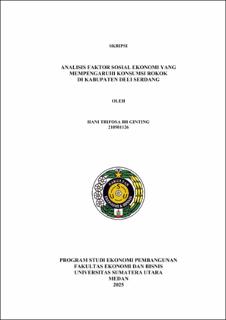| dc.description.abstract | This study aims to examine the influence of socio-economic factors,
namely income, cigarette prices, education, and employment status on cigarette
consumption. in Deli Serdang Regency. The approach used is quantitative
descriptive with binary logistic regression analysis method. Data were collected
through questionnaires distributed to 100 smoker respondents in three sub
districts in Deli Serdang Regency. The sampling technique used the snowball
sampling method, with the determination of the number of samples based on the
Lemeshow formula.
The results showed that income had a significant effect on cigarette
consumption in the middle income group, and was not significant in the high
income group. The price of cigarettes had a significant and positive effect, which
actually increased the likelihood of someone becoming a heavy smoker, this is
contrary to the initial hypothesis that high prices will suppress consumption. The
level of education showed a negative relationship to cigarette consumption, and
was not statistically significant. Employment status also had no significant effect,
but formal workers tended to have a greater chance of becoming heavy smokers
than informal workers.
Overall, this study indicates that price policy alone is not necessarily
effective in reducing cigarette consumption, especially among heavy smokers.
Therefore, a more comprehensive policy approach is needed, including increased
education and interventions based on socioeconomic status. | en_US |


